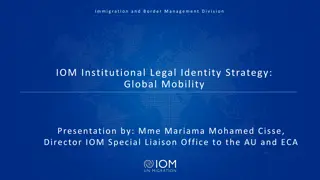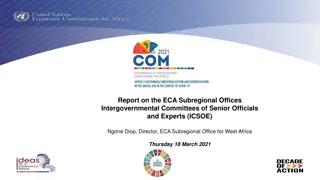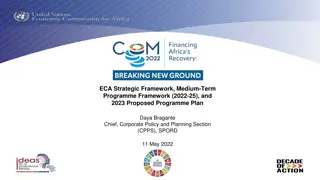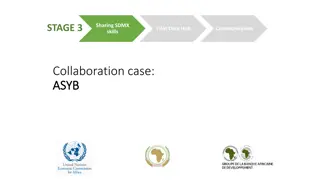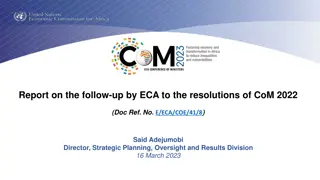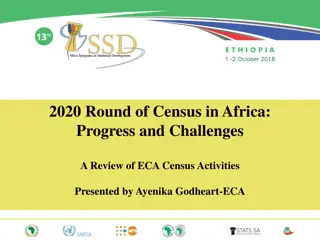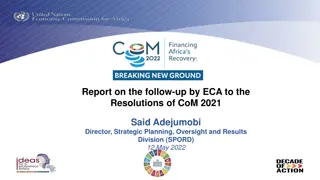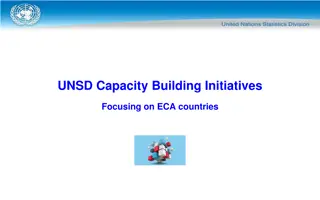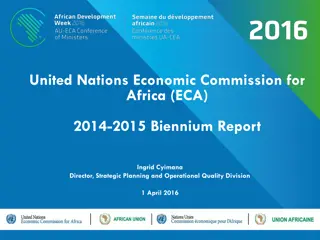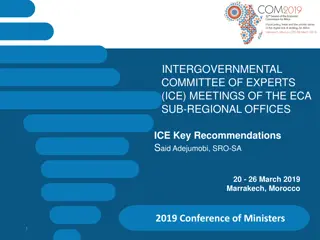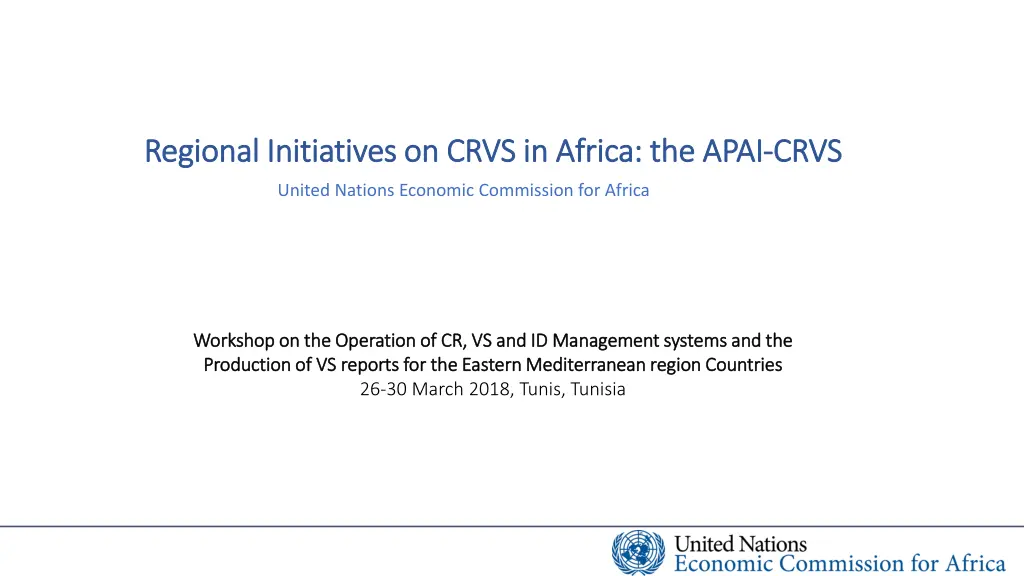
Initiatives on Civil Registration and Vital Statistics in Africa
Explore regional initiatives and progress on Civil Registration and Vital Statistics (CRVS) in Africa, including challenges, recommendations, and key initiatives. Learn about the background of CRVS systems in African countries, major challenges faced, and the way forward for improvement. Discover the developments in CRVS systems over the past 8 years, such as the establishment of the Conference of African Ministers Responsible for Civil Registration and the African Programme on Accelerated Improvement of CRVS (APAI-CRVS).
Download Presentation

Please find below an Image/Link to download the presentation.
The content on the website is provided AS IS for your information and personal use only. It may not be sold, licensed, or shared on other websites without obtaining consent from the author. If you encounter any issues during the download, it is possible that the publisher has removed the file from their server.
You are allowed to download the files provided on this website for personal or commercial use, subject to the condition that they are used lawfully. All files are the property of their respective owners.
The content on the website is provided AS IS for your information and personal use only. It may not be sold, licensed, or shared on other websites without obtaining consent from the author.
E N D
Presentation Transcript
Regional Initiatives on CRVS in Africa: the APAI Regional Initiatives on CRVS in Africa: the APAI- -CRVS CRVS United Nations Economic Commission for Africa Workshop on the Operation of CR, VS and ID Management systems and the Workshop on the Operation of CR, VS and ID Management systems and the Production of VS reports for the Eastern Mediterranean region Countries Production of VS reports for the Eastern Mediterranean region Countries 26-30 March 2018, Tunis, Tunisia
Outline Outline Background Regional Initiatives and Progress on CRVS in Africa Major Challenges Recommendations of the Fourth COM Way Forward
Background Background Most African countries have had a civil registration system for several decades starting from the Colonial period However, the civil registration systems have stalled or reversed, mainly because of: Colonial heritage: the use of registration and identification for discrimination of indigenous people, denial of right for movement, social exclusion and injustice; Inadequate awareness about CRVS multiple uses for legal, administrative and statistical purposes Absence of national CRVS improvement strategic plans: initiatives were mainly reactive, dominated by isolated project rather than being guided by national strategic plans; Lack of coordination and collaboration between national stakeholders on CRVS; Frequent emergencies and instability related to conflicts and economic downturns.
Regional Initiatives on CRVS in Regional Initiatives on CRVS in Africa Africa The last 8 years saw encouraging initiatives and momentum on CRVS systems improvements in Africa. The major initiatives include: Conference of Ministers: the establishment of the Conference of African Ministers Responsible for Civil Registration in August 2010 set the momentum for political commitment on CRVS improvement at country and regional level; African Programme on Accelerated Improvement of Civil Registration and Vital Statistics (APAI-CRVS): the development of regional programmatic framework APAI-CRVS to coordinate and guide an integrated and holistic CRVS systems improvement initiatives in the continent; Pan-African organizations: the collaborative environment created by the three pan-African organizations (AUC, ECA and AfDB) has helped to guide the CRVS systems in Africa; Africa CRVS Core Group (RCG): establishment of the RCG helps to provide coordinated technical and financial supports for countries and regional CRVS improvement initiatives;
CRVS Initiatives CRVS Initiatives in in Africa Africa- - Milestones in the last 8 Years Milestones in the last 8 Years 2009 June Meeting of Experts held in Dar-Es-Salam, recognized CRVS as multi-sectoral & multi-disciplinary system 2010 August First Conference of Ministers was held in Addis Ababa, Ethiopia 2011 March First Meeting of the Regional Core Group in Addis Ababa, Ethiopia 2012 January 7th Africa Symposium on Statistical Development (ASSD) in Cape Town, South Africa 2012 September Second Conference of Ministers in Durban, South Africa 2012 September APAI- CRVS endorsed as the programme framework in Durban, South Africa 2012 November 8th ASSD in Yamoussoukro, Cote d'ivoire 2013 August Training of pool of regional Experts in Gaborone, Botswana 2014 February 9th ASSD in Gaborone, Botswana 2015 February - Third Conference of Ministers in Yamoussoukro, Cote d'ivoire 2016 January - African Member States declared 2017-2026 to be CRVS Decade for Africa 2017 December - Fourth Conference of Ministers in Nouakchott, Mauritania
Important Declarations by the COMs and progresses made Declarations Progresses Call for Countries commitment to strengthen their CRVS systems Improved political commitment and support for CRVS improvement both at national and regional levels Recognized the need for an integrated and holistic approach APAI-CRVS was established as regional programme framework for an integrated and holistic CRVS improvement approach Called for improved coordination among stakeholder at the regional and country levels Regional CRVS Core Group constituted; High level and Technical level coordination committees constituted in many countries Called upon partners to develop capacity and provide technical support on CRVS in countries Developed a pool of experts; developed tools and guidelines, trained a large number of officials, supported technical missions, and south-south cooperation
Important Declarations by the COMs and progress made Called upon countries to conduct comprehensive assessments and develop action plans development partners to support About 40 countries have undertaken or initiated assessments on their CRVS systems. Several countries have developed strategic plans, and few of them started implementing their SPs. 7th, 8th and 9th ASSD focused exclusively on CRVS resulting in improved coordination among CR and Statistical agencies Called upon the Africa Symposium on Statistical Development to prioritize CRVS Called for the alignment of health systems with CRVS systems Increased coordination and collaboration between the Health sector and the CRVS systems in many countries Develop results based monitoring and evaluation systems at the regional level APAI-CRVS Regional web-based monitoring system has been developed Declared 2017-2026 to be the Decade for CRVS in Africa . Five-year APAI-CRVS Strategic Plan developed for 2017- 2021 and endorsed by the fourth COM
Challenges Challenges Despite the remarkable progress made over the past few years, many challenges remain to be obstacles. Some of the major challenges include: No predictable financing for implementing CRVS improvement programme at country and regional levels The APAI-CRVS Secretariat is not adequately staffed posing a risk to the programme Not adequate experts available for providing technical assistance to countries for example in causes of death and CRVS business process improvement No systematic measurement of level of completeness of registration in place Some countries are yet to assess their CRVS systems and develop strategic plan There is a lag in implementing Ministerial recommendations and national strategic plans
Challenges Challenges The 2017 regional monitoring results indicates that : About half of the countries do not have adequate legislation for producing vital statistics, only few countries produce annual vital statistics from their civil registration system; Nearly13% of the countries have no government budget for civil registration operations; Birth registration completeness remains low (estimated at 56% for 2015), while death registration remain below 40% from 2012 to 2015; Several countries do no estimate the level of coverage and completeness of their civil registration system; The use of ICT is minimal or non-existent, and where it exists, it is not integrated with the health management information system and the national ID management system;
Major recommendations Major recommendations by by the the Fourth COM in December 2017 Fourth COM in December 2017 Strengthen the use of CRVS for harnessing developmental potentials in the framework of the Regional Agenda 2063 and the Global SDGs 2030, paying particular attention to the demographic dividend and population movement; Improving mortality and causes of death statistics by improving the linkages between the Health sector and CRVS systems Implementing the APAI-CRVS systems strategic plan for the period 2017-2021 with appropriate support from African Union member States and partners; Enhancing research and development efforts, which foster methodologies that improve the processes pertaining to civil registration and vital statistics among African Union member States; Carry-out resource mobilization efforts to improve civil registration and vital statistics systems; Include refugees, internally displaced persons and persons at risk of statelessness in CRVS systems and factor them into improvement strategies and scaling-up plans; Developing shared ICT assets in support of effective CRVS systems for the continent, which are built to common standards and are interoperable with other governmental systems, such as health and identity management;
Way Foreword Way Foreword Predictable financing needed for implementing CRVS improvement programme at country and regional levels Need for more sustainable capacity development measures Countries who are yet to initiate national CRVS assessment should do so Countries should set up mechanisms for measuring completeness of registration The APAI-CRVS five-year (2017-2021) strategic plan needs to be resourced and implemented effectively


